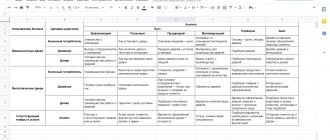At the end of the school year, your child “slipped” in all subjects and, it seems, gave up on studying. You exhaled with the onset of school holidays and decided to give him and yourself a rest and return to the issue of academic performance closer to school. Well, now is the time - you can calmly discuss the problems that have arisen with the school and try to solve them.
There are as many reasons why children don't want to study as there are children. But, as experience shows, several main ones can be identified, and if they are grouped, it will become clear through which channels and where the energy flows, which should be directed to study. I would describe the biggest “black holes” as follows: workload, relationships, hobbies.
Load: when a teenager does not have time to live
Modern children are so busy with studies and extracurricular activities (clubs, tutors, sports clubs) that they have absolutely no free time left. And if, until adolescence, they drag their feet, at the very least, then they begin to rebel, knowing full well that their parents’ screams and threats will lead to nothing. As one teenager told me, “they won’t stop feeding you, they won’t kick you out of the house.”
Excessive busyness destroys motivation, reduces creativity, and inhibits the development of leadership qualities. And it has a negative impact on academic performance - the child literally stops “keeping up.” Homework has to be done late in the evening, when he is tired and has trouble thinking clearly. Of course, a teenager uses every opportunity to dodge unbearable loads.
Overwork also affects health - schoolchildren begin to get sick more often, which means they miss classes. Those who are involved in sports or creativity periodically miss classes due to training camps, competitions, and concerts. The reasons seem to be valid, but all this ultimately leads to serious gaps in knowledge that the child cannot fill on his own.
Having missed several classes, he is unable to engage in the learning process either in class or at home - he simply does not understand what the teacher is talking about and does not know how to approach homework, which accumulates like a snowball. At first he hides this from his parents, pretends that he is studying, then, in order to “not run into trouble,” he begins to skip classes.
Advice from psychologists for parents
During adolescence, new authorities appear in a child’s life, first love and bright hobbies arise. Studying homework becomes boring and uninteresting, because it interferes with communication and walks with friends. Is it necessary to force a child to give up important moments for him in favor of a future career? Psychologists advise following daily rules of behavior that will help improve relationships and not cause the situation to worsen.
A few rules of conduct for parents
- do not scold for bad grades, do not insult the child;
- set realistic goals for a quarter or half a year;
- do not lure students into studying with a new smartphone;
- notice even small successes, praise for corrected grades;
- show respect for the individual, speak without raising your voice;
- Help in lessons should always be offered, but not imposed;
- do not compare the teenager with the children of friends and excellent students from the class.
It is necessary to explain the benefits of studying gently and without excessive insistence. It is important to help your child correctly distribute time between lessons and hobbies so that overwork does not occur. During exams or complex testing, it is necessary to ensure proper nutrition, give vitamin complexes, and create conditions for rest.
Relationships: when going to school is scary or unnecessary
Children's desire to learn and go to school is also influenced by the classroom environment, relationships with peers and teachers.
In the lower grades, it is especially important how the teacher treats the child. One mother complained to me that the teacher did not like her son. Calling my mother to school, she said: “I cannot work with your child. My ulcer opens when I see him.” She could not contain her irritation as she watched the boy mechanically wind some strings around his finger during a lesson. Of course, the child felt this, came home from class upset and did not want to do his homework.
, relationships with classmates come to the fore —they largely determine their emotional state. When relationships don't work out or a child becomes the target of bullying, he has no time for studying.
Timely Praise
It will come in handy when certain difficulties arise in understanding a particular topic. Remember that school subjects are not always easy. A kind word can heal the soul, direct it to the right path, and try to take the first timid step. In order not to constantly wonder how to get a teenager to study at school, it is better to praise your own child more. You will be amazed at how your child will begin to blossom right before your eyes. This approach will help him develop adequate self-esteem and achieve great victories in the future.
Hobbies: a waste of time?
Another channel for “wasting” energy is the unplanned, uncontrollable hobbies of children, which, from the point of view of adults, do not give the child anything - as they say, “neither the mind nor the heart,” but only “distract from the task.”
It could be teenagers: for some it’s a music group, for others it’s a football team - children get together to listen to music, discuss the news, go to the stadium or just roam the streets in search of adventure. Someone is seriously interested in traumatic extreme sports - roofing, parkour, street racing, hooking.
Of course, gadgets also eat up a lot of time : here are computer games, communication on the Internet, chats, correspondence. The child counts the minutes until the end of lessons - all attention is focused on something else.
And teenage love can absorb all your strength and thoughts. Although it happens that it is the desire to impress the object of sympathy, to become a leader, to become the best, that forces a child to learn - to “strive and achieve.”
Regardless of the reason why a child does not want to study, we, parents, must put everything aside, dive into the problem and devote as much time as necessary to solving it. The most important thing is not to threaten or punish, so as not to destroy contact with the child. On the contrary, we need to get closer and help him in every possible way. What exactly should I do?
When does the formation of learning motivation suffer?
Motivation becomes dull or disappears altogether in several cases.
First.
The age-related characteristics of children's development are not taken into account. For example, in order to have good attention, the child must have developed mechanisms for voluntary regulation of activity. These mechanisms are fully formed by the age of 9. Therefore, it is necessary not to force, but to organize the process in such a way as to effectively use those minutes when the child can concentrate.
Second.
The intensity of the material supply is too high, the pace of activity is unbearably fast. All children learn at different speeds. And that's absolutely normal. Get used to the pace at which a first grader is comfortable working. After all, apple varieties are also different - some ripen by mid-summer, while others by November.
Third.
The age-related need for repeated repetition of the material is not taken into account. Don’t be afraid to repeat what you’ve learned with your child—this practice will definitely be beneficial.
Fourth.
The child works to the limit of his capabilities. Turn on gentle mode. It's better to underload a little than overload.
“Can’t or won’t?” - a psychologist will help answer this question.
Set priorities
Noticing that children are tired and tired, parents often begin to give them medications to help them concentrate and improve their performance—in fact, they get them hooked on doping. I always warn against this. If the problem is excessive workload, you need to reduce it, give the child a break, and find the optimal pace of life for him. And don’t expect results right away - let him recover first.
It is necessary to carry out a kind of inventory - what the child is doing, where his energy goes and why there is no energy left for study. If he runs around in circles, as in Agnia Barto’s poem, he needs to think about what he should give up in order to focus on his studies.
All children are different, their abilities are individual, some are better at one thing, and others at another. And if a child is not doing well in school, he should know that he is not mediocre, not hopeless, there is always something he does well: one plays football well, another sings, a third draws, a fourth bakes pies. Therefore, in no case should you deprive your child of an activity that he likes and in which he feels successful.
I know a family where, due to poor grades, the boy was taken out of the hockey section, although he was one of the best on the team. And what did this give? The child was terribly upset, offended by his parents - after all, he was left without his favorite activity. The relationship was ruined, and he never began to study better. That area of the child’s life in which he felt confident, where he had real achievements, was cut off by his parents, and he found himself only in the role of a lagging behind, catching up, who has no choice but to follow others, and this is difficult, offensive, humiliating .
Origins of the problem
The main difference between a young person just preparing to enter an independent life and an adult is that he takes everything too seriously. The teenager perceives physiological changes occurring in the body as something supernatural. Some psychological difficulties during this period of life can cause him to have a real panic attack.
Aggression serves as a unique way of protecting a young man from the “unfriendly” outside world. An important point at this time is the question of how to force a teenager to study. The psychology of young men is such that they consider all the advice of their elders from the point of view of their own unstable inner world. Perceiving any problem through the prism of their ideas about how life works, they often suffer from excessive impressionability.
Pull up neglected items
When some item is neglected and it is not clear how to approach it, you can use what I call the “Swiss cheese technique”: if you have a wall of problems in front of you, you must first scroll through two or three holes in it, and then gradually, step by step increase their size until the wall collapses.
In our case, we need to determine which subjects are now the most important and which topics the child has not mastered, what needs to be improved, and then move on to specific actions - deal with one neglected paragraph from the textbook, then proceed to the next, and so on.
Of course, it will take time and patience, but we will see how the child’s attitude towards classes changes: as soon as he begins to understand and assimilate the material, fear disappears, confidence in his abilities appears, and with it interest in learning. If the subject is difficult and we cannot help ourselves, then we need to temporarily hire a tutor.
It happens that parents force their child to study a difficult subject for two hours at a time and make sure that he does not get distracted. But few people can focus on anything for that long. The child sits for these two hours, suffers, begins to secretly do other things, continuing to pretend to be a worker - and things are still there...
Therefore, it is important to find the best way to work independently. You can decompose a big thing into a chain of small ones. For example, I read the statement of the problem, sat and thought for ten minutes (you can set an hourglass or turn on a timer), then took a short break, drank tea or jumped, played with the cat. Then he concentrated again and solved the problem to the end.
It is necessary to teach the child, after strong concentration, to switch to a short rest and again to maximum concentration.
Children are “forced” to learn primarily by positive emotions and success. The child achieves something, he develops faith in his own strength, it gives him the energy to move on. If we help him feel successful - in any activity, be it sports, music, drawing, poetry - then this success will become a trigger, a locomotive that will pull the rest, including school grades. And most importantly, it will return the child’s desire to learn.
What hinders the motivation of older schoolchildren?
- sustained interest in some academic subjects to the detriment of mastering others;
- the desire to choose for study only those subjects in which he will take the Unified State Exam;
- pre-exam stress, various fears; depressive states;
- dissatisfaction with the form of educational activities, some feel a lack of creative and problem-search forms of educational activity;
- negative attitude towards forms of strict control on the part of teachers and parents;
- a sense of adulthood and the value of relationships;
- preservation of situational motives for choosing a life path (for example, by analogy with a friend);
- insufficient stability of social motives of debt when faced with obstacles.
By outlining together with your child a future profession of his choice (as a long-term goal), you can reach the immediate goal - successful completion of high school (receiving a certificate, high scores on the Unified State Exam, obtaining high-quality knowledge).
“Help in professional self-determination is the most important motivation tool!”
Help improve relationships
If the reason for poor studies is the biased attitude of the teacher, the child risks finding himself between a rock and a hard place: at school he is “harassed” by the teacher, and at home his parents “pressure” him. This is a dead end: we will lose contact with the child, and the problem will never be solved.
To solve it, we will have to talk with the teacher, try to hear him, explain something to him, somehow build a relationship. If we understand that it will not be possible to correct the situation, we need to change teachers - move to another class or to another school. Moreover, it is necessary to act quickly: a child should not be in the field of powerful negative emotions for a long time.
In the same way, you need to understand bad relationships with peers. If a child is being bullied, that’s one question, but if the child cannot find a common language with his classmates, we need to teach him to communicate and establish contacts.
Positive attitude
In any case, it is important to maintain good spirits and optimism. The child must learn that there are no unsolvable problems. Demonstrate by your own example that any difficulties can be overcome if you tackle them with a smile. A positive attitude helps to increase concentration and thoughtful study of educational material.
Thus, there are many ways to get a teenager to study. The advice to parents set out in this article is aimed primarily at establishing personal contact and forming mutual understanding between an adult and a child.
Introduce restrictions
What to do with hobbies that consume our children’s time and energy? You should not unequivocally reject or criticize what is now important and significant for the child. Sometimes it’s enough just to wait it out, and the hobby will fade away on its own, dissipate, disappear. But this happens, alas, not always.
Then you need to show interest, try to find some positive or rational grain in the child’s activities. This will at least avoid confrontation. And then - limit the time of “undesirable” activities, gradually reducing it.
For example: “Do you like parkour? In general, I don’t mind that you play sports, but let’s agree: you devote no more than two hours a day to this, and you perform dangerous stunts only when you are absolutely ready for them.”
Or: “I understand that you are in love and cannot think about anything else. But you will go on a date only after you have done your homework, and you must return home no later than ten in the evening.”
It's the same with gadgets. When we sit down at the table, we put everything aside and are not distracted by any devices. And when we go to bed, we turn everything off and put it away from the bed. If we set such rules and boundaries without criticism and reproaches, then there will be less aggression in response.
Advertising
Don't do homework instead of your son or daughter
Parents should not take responsibility for their child’s education. At 7 years old, the habit of studying is much easier to form than at 12. The role of parents is to guide and support, and, if necessary, help the child understand complex things, but in no case do everything for him. Show your son or daughter how to collect a briefcase, how to fill out a diary, in what order to do homework, and step aside.
If you are checking assignments and notice an error, invite your child to find and correct it himself, but do not give ready-made solutions. The check can gradually be reduced only to the fact of completing tasks: if 4 exercises are given, 4 must be done. With this approach, the child will make mistakes, but this is the only way his responsibility will be formed. This will make his performance real and not artificial.
Reward for the process, not the result
Harvard University professor Roland Fryer conducted a study on schoolchildren's performance. 36 thousand students from 250 schools took part in it. It turned out that the best effect on learning is the encouragement of specific actions - reading books, doing homework, being active in class. Grades increase for children who receive rewards for the process, and not for the final result, and the reward is not money or things.
Often it is enough to praise the child, go somewhere with him, and pay for activities that are interesting for him. But he should receive encouragement immediately, and not sometime later. The promise “If you pass the exam at the end of the year, you will get a new smartphone” does not have any effect. It is necessary to celebrate intermediate finishes, not the final.
The correct setting of goals disciplines and mobilizes well. No moral teachings, edifications or calls - “You must pass the Unified State Exam well!” - will not help if the child does not know what exactly to do. But if we say: “This week you must take two extra classes in physics, solve five problems in mathematics today, prepare a report on history,” this is already a specific plan of action, clear and understandable, for which you can ask.
Cognitive abilities are very important, but they do not determine everything. If you trace the fate of excellent and C students and see how their destinies turned out, it becomes clear that school achievements are not a guarantee of future success. Not all of my clients, many of whom are on Forbes lists, were excellent students at school and behaved well in class. Although, of course, it is easier to train an A student than to cultivate in a child perseverance, curiosity, the ability to communicate, cope with stress, and a creative approach to any task.
Bad grades are a sign of trouble, a bell that should make us stop, look at what is happening with the child, and help him cope with difficulties.
Motive shift to goal
The author of the method is A. N. Leontyev.
Children are not always interested in studying. But many things are simply difficult: reading, writing, counting. But the initial motive can change during the course of the action, when an activity that we do not like at the very beginning gradually begins to be filled with special meaning, and as a result we already want to engage in this activity!
Example. Initially, the student reads the book because there is a clear goal: he must answer tomorrow. The student does not like the subject, but he reads carefully. The act of reading has no intrinsic motivation, it is directed towards something else, and if the lesson is cancelled, he will immediately stop reading. But if interest arose during the reading and preparation, the news about the cancellation of the lesson will not stop the student. There will be a shift in motive to goal: what was initially not attractive now acquires its own significance, that is, it becomes valuable in itself for a person. The motive for answering and getting a mark shifts to the motive for reading an interesting text.
Exercise
To understand how the mechanism of shifting motive to goal works in a child, trace when this happened in your life.
1. Give an example from your personal life when there was a shift in motive to goal. 2. Trace the path of transformation of a goal into a motive: how did feelings change when interest appeared? 3. What conditions contributed to the transition?
“Our task is to create conditions for the child to achieve his first successes. And then things will get better.”










